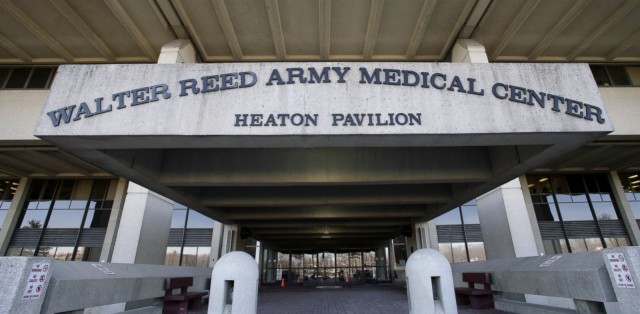NEA: Creative arts therapy a useful tool for military patients
Featured News | November 12, 2015

From a National Endowment for the Arts press release:
Today, the National Endowment for the Arts announces expansion of the NEA Military Healing Arts Partnership, a collaboration with the Department of Defense that supports music, writing, and visual art therapy at military care facilities including the National Intrepid Center of Excellence at Walter Reed Bethesda and the Fort Belvoir Community Hospital Brain Wellness Center in Virginia. The announcement takes place as part of November’s designation as Warrior Care Month, a Defense Department recognition to highlight resources available to wounded warriors, their families, and caregivers.
Today’s announcement follows Chairman Chu’s remarks at the Pentagon for the Department of Defense’s Healing Arts Recognition Event, which honored service members and drew attention to the important role healing arts and art therapy play in service members’ recovery, rehabilitation, and transition process. At the event, Chu discussed the expanded governmental partnership between the two governmental agencies.
“We are honored to work with the U.S. Department of Defense to expand our Creative Arts Therapy programs for our military members affected by traumatic brain injury, post-traumatic stress, and other psychological health conditions as a result of their service,” said NEA Chairman Jane Chu. “This partnership recognizes that arts interventions sit at the core of integrative, patient-centered care. Above all, we are deeply inspired by how these service members use art-making as a tool to bolster their resilience and accelerate their ability to heal, and to carry out their commitment to serve our nation, and their communities and loved ones, to the fullest.”
The NEA Military Healing Arts Partnership began in 2011 when the Walter Reed National Military Medical Center invited the NEA to help build out the creative arts therapy program at its new flagship National Intrepid Center of Excellence (NICoE). This is one of several new regional centers using an integrative healthcare model to treat service members with traumatic brain injury and associated psychological health issues. After successfully piloting the program at Walter Reed, the NEA was invited by Fort Belvoir to replicate the program in their new integrative care facility. The partnership now involves support for multiple creative arts therapy disciplines (therapeutic writing, art therapy, and music therapy) at Walter Reed and Fort Belvoir.
The NEA is supporting a growing roster of creative art therapists to help expand programs initiated by art therapist Melissa Walker and other integrative care providers working within the military. At Walter Reed, the NEA is supporting music therapist Rebecca Vaudreuil and art therapist Jessica Gada, alongside creative writing instructors Ron Capps and Dario Di Battista. At the Fort Belvoir Brain Wellness Center, music therapist Hannah Bronson will begin working with art therapist Jacqueline Jones, who launched their Creative Arts Therapy program with NEA support in 2013. The NEA is also collaborating on a research project with the NICoE and Drexel University’s Creative Arts Therapy PhD program involving a thematic analysis of masks created through the art therapy program at Walter Reed Bethesda.
Since November 2011, NEA-supported writing, music, and visual art therapy at Walter Reed and Fort Belvoir have reached more than 1,000 service members at Walter Reed, and 128 service members at Fort Belvoir.
Creative art therapy and the integrated healthcare model
Creative arts therapy is a non-invasive and cost-effective medical treatment in which certified creative arts therapists work closely with other health professionals to create individual treatment plans with measurable outcomes. Patients may receive therapies such as painting, ceramics, music therapy, and therapeutic writing to improve health conditions for a wide range of medical, physical, neurological, and psychological health issues, such as depression, anxiety, cognitive function, memory, and impaired motor skills. Previous patient have described how art therapy activities have improved their cognitive skills and ability to process trauma and confront issues relating to frustrations, transitions, and grief.
The NEA Military Healing Arts Partnership supports the integrated healthcare model, in which creative arts therapists collaborate closely with a diverse team of healthcare professionals (such as physicians, neurologists, nurses, psychologists, physical therapists, and others) to share information and advance patient healing. The partnership seeks to improve understanding of the impact of healing arts in clinical and wellness arenas, improve patient engagement and satisfaction, increase the number of service members benefitting from creative art therapy treatment, and advance the Military Health System’s Quadruple Aim to promote “better health, better care, lower cost, and improved readiness.”
More on NEA arts and health efforts
The NEA is leading efforts to support research, policy, and programs on arts as a tool for health and well-being across the lifespan. The NEA’s Interagency Task Force on the Arts and Human Development convenes federal agencies to share research, resources, and best practices on arts and health research, producing public webinars, symposia, and reports, including a recent report encouraging more research on the neuroscience of creativity. NEA research grants investigate the value and impact of the arts, including its effects on learning and health. The NEA also devoted an issue of its quarterly magazine to the topic of healing arts.
- Select
- April 2024
- March 2024
- February 2024
- January 2024
- December 2023
- November 2023
- October 2023
- September 2023
- August 2023
- July 2023
- June 2023
- May 2023
- March 2023
- February 2023
- January 2023
- November 2022
- October 2022
- September 2022
- August 2022
- July 2022
- June 2022
- May 2022
- April 2022
- March 2022
- February 2022
- January 2022
- December 2021
- November 2021
- October 2021
- September 2021
- August 2021
- July 2021
- June 2021
- May 2021
- April 2021
- March 2021
- February 2021
- January 2021
- December 2020
- November 2020
- October 2020
- September 2020
- August 2020
- July 2020
- June 2020
- May 2020
- April 2020
- March 2020
- February 2020
- January 2020
- December 2019
- November 2019
- October 2019
- September 2019
- August 2019
- July 2019
- June 2019
- May 2019
- April 2019
- March 2019
- February 2019
- January 2019
- December 2018
- November 2018
- October 2018
- September 2018
- July 2018
- June 2018
- May 2018
- April 2018
- March 2018
- February 2018
- January 2018
- December 2017
- November 2017
- October 2017
- September 2017
- August 2017
- July 2017
- June 2017
- May 2017
- April 2017
- March 2017
- February 2017
- January 2017
- December 2016
- October 2016
- September 2016
- August 2016
- July 2016
- June 2016
- May 2016
- January 2016
- December 2015
- November 2015
- October 2015
- September 2015
- August 2015
- July 2015
- June 2015
- May 2015
- April 2015
- March 2015
- February 2015
- January 2015
- December 2014
- November 2014
- October 2014
- September 2014
- August 2014
- July 2014
- June 2014
- May 2014
- April 2014
- March 2014
- February 2014
- January 2014
- December 2013
- November 2013
- October 2013
- September 2013
- August 2013
- July 2013
- June 2013
- May 2013
- April 2013
- March 2013
- February 2013
- January 2013
- September 2012
- August 2012
- July 2012
- June 2012
- May 2012
- April 2012
- March 2012
- February 2012
- January 2012
- December 2011
- November 2011
- October 2011
- September 2011
- August 2011
- July 2011
- June 2011
- May 2011
- April 2011
- March 2011
- February 2011
- January 2011
- December 2010
- November 2010
- October 2010
- September 2010
- August 2010
- July 2010
- June 2010
- May 2010
- April 2010
- March 2010
- February 2010
- January 2010
- December 2009
- November 2009
- October 2009
- September 2009
- August 2009
- July 2009
- June 2009
- May 2009
- April 2009
- March 2009
- February 2009
- January 2009
- December 2008
- November 2008
- October 2008
- September 2008
- August 2008
- July 2008
- June 2008
- May 2008
- April 2008
- March 2008
- February 2008
- January 2008
- December 2007
- November 2007
- October 2007
- September 2007
- August 2007
- July 2007
- June 2007
- May 2007
- April 2007
- March 2007
